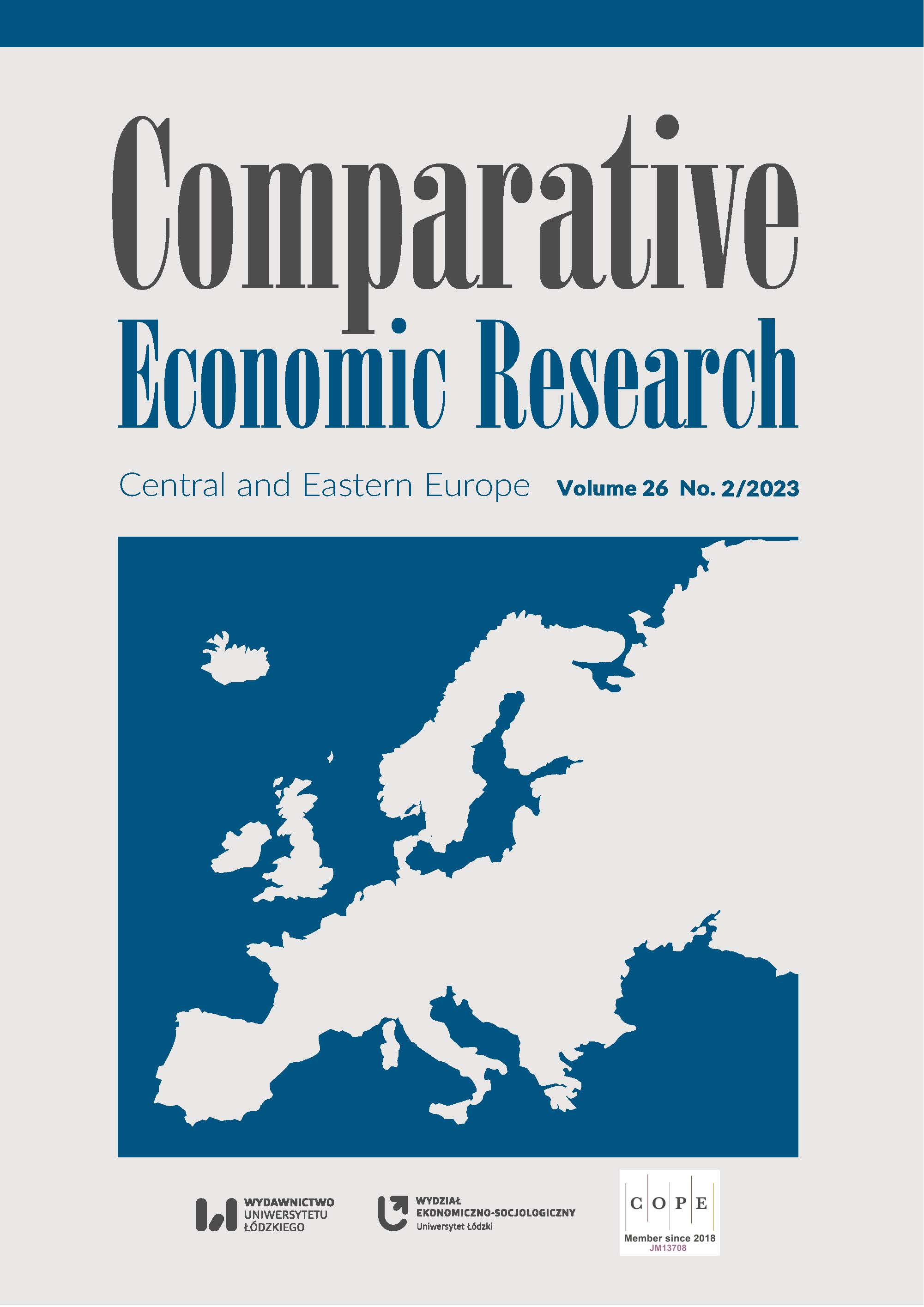Global and European Foreign Trade during the COVID–19 Pandemic
DOI:
https://doi.org/10.18778/1508-2008.26.14Keywords:
European Union, international trade, e‑commerce, digital economy, Digital Europe, Digital CompassAbstract
The article aims to answer the following questions: 1) How has the European Union’s international trade developed in terms of goods and geography in the last two years, and to what extent has it been resilient to the effects of the COVID–19 pandemic? 2) To what extent has the ambitious path to the development of the digital economy, including the particularly dynamic development of e‑commerce in recent years, contributed to reducing the negative effects of the COVID–19 pandemic?
The results of the research show that the global economy experienced a huge decline in trade in goods and services during the COVID–19 pandemic: World trade in goods fell by 7.4% in 2020, which means that global exports amounted to USD 17.6 trillion, i.e., USD 1.4 trillion less than in the previous year. It was the largest annual decline since the 2009 recession, when trade fell by 22%. However, a much stronger decline was recorded in world trade in services, which in 2020 shrank by 20% compared to 2019. During the COVID–19 pandemic, the dynamic development of global e‑commerce was noted. According to the data presented in the UNCTAD report of May 3, 2021, global e‑commerce increased to USD 26.7 billion. Business‑to‑business (B2B) sales dominate in e‑commerce. E‑commerce accounts for 30% of the world’s gross domestic product (GDP) and covers both business‑to‑business (B2B) and business‑to‑consumer (B2C) sales.
Downloads
References
European Commission (n.d.), Digital Europe Programme, https://commission.europa.eu/funding-tenders/find-funding/eu-funding-programmes/digital-europe-programme_en (accessed: 10.12.2022).
Google Scholar
European Commission (n.d.), Europe’s Digital Decade: digital targets for 2030, https://commission.europa.eu/strategy-and-policy/priorities-2019-2024/europe-fit-digital-age/europes-digital-decade-digital-targets-2030_en (accessed: 10.12.2022).
Google Scholar
European Commission (2020a), Proposal for a Regulation of the European Parliament and of the Council on a Single Market For Digital Services (Digital Services Act) and amending Directive 2000/31/EC, COM(2020) 825 final, https://eur-lex.europa.eu/legal-content/EN/TXT/PDF/?uri=CELEX:52020PC0825&from=en (accessed: 26.02.2022).
Google Scholar
European Commission (2020b), Proposal for a Regulation of the European Parliament and of the Council on contestable and fair markets in the digital sector (Digital Markets Act) – COM(2020) 842 final, https://eur-lex.europa.eu/legal-content/EN/TXT/PDF/?uri=CELEX:52020PC0842&qid=1652263074485&from=EN (accessed: 26.02.2022).
Google Scholar
European Commission (2021a), Annex to the Communication from the Commission to the European Parliament, the Council, the European Economic and Social Committee and the Committee of the Regions. Trade Policy Review – An Open, Sustainable and Assertive Trade Policy, https://eur-lex.europa.eu/resource.html?uri=cellar:5bf4e9d0-71d2-11eb-9ac9-01aa75ed71a1.0001.02/DOC_2&format=PDF (accessed: 3.02.2022).
Google Scholar
European Commission (2021b), Communication from the Commission to the European Parliament, The Council, The European Economic and Social Committee and the Committee Of The Regions. 2030 Digital Compass: the European way for the Digital Decade, COM(2021) 118 final, https://cyberpolicy.nask.pl/wp‑content/uploads/2021/03/Cyfrowy‑Kompas‑na‑rok-2030‑europejska‑droga‑w‑cyfrowej‑dekadzie.pdf (accessed: 19.02.2022).
Google Scholar
European Commission (2021c), Questions and Answers: An open, sustainable and assertive trade policy, https://ec.europa.eu/commission/presscorner/detail/en/qanda_21_645 (accessed: 10.02.2022).
Google Scholar
Eurostat (n.d.), EU trade in 2021 strongly recovered from the COVID–19 pandemic, https://ec.europa.eu/eurostat/statistics-explained/index.php?title=International_trade_in_goods#EU_trade_in_2020_strongly_impacted_by_the_COVID-19_pandemic (accessed: 16.02.2022).
Google Scholar
Eurostat (n.d.), The three largest global players of international trade: EU, China and the USA, https://ec.europa.eu/eurostat/statistics-explained/index.php?title=International_trade_in_goods#The_three_largest_global_players_for_international_trade:_EU.2C_China_and_the_USA (accessed: 20.02.2022).
Google Scholar
Gender Equality in EU’s foreign and security policy. European Parliament resolution of October 23, 2020, on Gender Equality in EU’s foreign and security policy (2021), Official Journal of the European Union, C 404/202, https://eur-lex.europa.eu/legal-content/EN/TXT/PDF/?uri=CELEX:52020IP0286&from=EN (accessed: 3.02.2022).
Google Scholar
https://trade.ec.europa.eu/doclib/docs/2016/january/tradoc_154149.pdf (accessed: 2.05.2022).
Google Scholar
International Labour Organization (2017a), Global Estimates of Child Labour. Results and trends, 2012–2016, https://www.ilo.org/wcmsp5/groups/public/@dgreports/@dcomm/documents/publication/wcms_575499.pdf (accessed: 17.02.2022).
Google Scholar
International Labour Organization (2017b), Global Estimates of Modern Slavery: Forced Labour and Forced Marriage, https://www.ilo.org/global/publications/books/WCMS_575479/lang--en/index.htm (accessed: 17.02.2022).
Google Scholar
International Monetary Fund (2021), World Economic Outlook. Recovery During a Pandemic. Health Concerns, Supply Disruptions, and Price Pressures, https://www.imf.org/-/media/Files/Publications/WEO/2021/October/English/text.ashx (accessed: 15.02.2022).
Google Scholar
International Monetary Fund (2022a), World Economic Outlook, April 2022. War Sets Back the Global Recovery, https://www.imf.org/en/Publications/WEO/Issues/2022/04/19/world-economic-outlook-april-2022 (accessed: 14.05.2022).
Google Scholar
International Monetary Fund (2022b), World Economic Outlook Update. Rising Caseloads, a Disrupted Recovery, and Higher Inflation, https://www.imf.org/en/Publications/WEO/Issues/2022/01/25/world-economic-outlook-update-january-2022 (accessed: 7.02.2022).
Google Scholar
Regulation (EU) 2016/679 of the European Parliament and of the Council of April 27, 2016, on the protection of natural persons with regard to the processing of personal data and on the free movement of such data, and repealing Directive 95/46/EC (General Data Protection Regulation) (2016), https://eur-lex.europa.eu/legal-content/EN/TXT/PDF/?uri=CELEX:32016R0679 (accessed: 26.02.2022).
Google Scholar
Trade Policy Review – An Open, Sustainable and Assertive Trade Policy (2021), Publications Office of the European Union, Luxembourg, https://trade.ec.europa.eu/doclib/docs/2021/april/tradoc_159541.0270_EN_05.pdf (accessed: 15.02.2022).
Google Scholar
UNCTAD (2020), Estimates of Global E‑Commerce 2019 and Preliminary Assessment of COVID–19 on Online Retail 2020, https://unctad.org/system/files/official-document/tn_unctad_ict4d18_en.pdf (accessed: 19.02.2022).
Google Scholar
UNCTAD (2021a), Global E‑Commerce Jumps to $26.7 Trillion, Covid–19 Boosts Online Retail Sales, https://unctad.org/news/global-e-commerce-jumps-267-trillion-covid-19-boosts-online-sales (accessed: 19.02.2020).
Google Scholar
UNCTAD (2021b), Global trade’s recovery from COVID–19 crisis hits record high, https://unctad.org/news/global-trades-recovery-covid-19-crisis-hits-record-high (accessed: 18.02.2022).
Google Scholar
UNCTAD (2021c), Handbook of Statistics, https://unctad.org/system/files/official-document/tdstat46_en.pdf (accessed: 30.03.2023).
Google Scholar
UNCTAD (2021d), Key Statistics and Trends in Internetional Trade 2020. Trade Trends under the COVID–19 Pandemic, https://unctad.org/system/files/official-document/ditctab2020d4_en.pdf (accessed: 2.05.2022).
Google Scholar
UNCTAD (2021e), Switzerland Climbs to Top of Global E‑Commerce Index, https://unctad.org/press-material/switzerland-climbs-top-global-e-commerce-index (accessed: 27.02.2022).
Google Scholar
Wysokińska, Z., Witkowska, J. (2021), Unia Europejska w gospodarce światowej, Wydawnictwo Uniwersytetu Łódzkiego, Łódź.
Google Scholar
DOI: https://doi.org/10.18778/8220-445-2
Downloads
Published
How to Cite
Issue
Section
License

This work is licensed under a Creative Commons Attribution-NonCommercial-NoDerivatives 4.0 International License.











